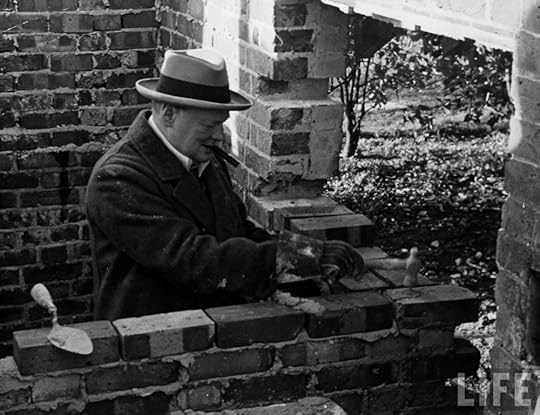Judithe Little's Blog
July 23, 2018
She Who Must Be Obeyed

Nineteen year old Clementine Hozier met 29-year old Winston Churchill in 1904 at a dance. He "stared and never uttered one word and was very gauche.” Four years later they met again. This time romance bloomed. Although the granddaughter of an earl, Clementine was poor and frugal. The announcement of her engagement to Winston was met with ridicule from high society over the fact that she made many of her own clothes.
She and Winston married in 1908 and spent the next 57 years together until Winston’s death at the age of 90. They had five children, including a daughter Marigold (nicknamed Duckadilly) who died of blood poisoning in the care of a nanny at the age of 3, a tragedy neither parent got over.
Though Clementine was a liberal, she was nonetheless devoted to her conservative husband and made supporting him her first priority. But behind the scenes, she told him what she thought and was the only person who could rebuke him for boorish behavior. Winston could be obstinate and temperamental, but he was always outspoken in his love for his wife. In correspondence, he called her “cat” and she called him “pug.” Their fights were usually about money. Winston, known for being “easily satisfied with the very best,” tended to overspend. During one dispute, she threw a plate of spinach at him. Winston, wisely, often referred to her as “she-whose-commands-must-be-obeyed.”
Taller than Winston, she was known as a better athlete. She loved horseback riding, tennis, and took up skiing at age 40. She could also rock a turban!!!
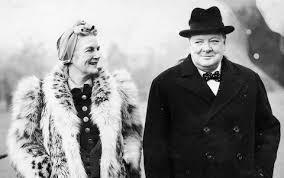
July 3, 2018
Friends to Enemies: Murder or a Horrible Necessity?

True or false?
On July 3, 1940, in an Algerian port, the British navy fired on and destroyed the fleet of their allies, the French, killing over 1,000 French sailors.
It seems unbelievable, but it’s true, a tragic confrontation between friends that inspired my novel Wickwythe Hall.
So how did two allies, who just days before fought side by side against the Germans, come to arms?
In May 1940, Hitler’s troops invaded France and quickly overpowered the French and British armies. In June, just one month later, France surrendered.
As part of the armistice terms, France agreed to turn over its fleet to the Germans. Most of the French ships were across the Mediterranean at Mers el-Kébir, an Algerian port. There, they had a terrible decision to make: surrender their ships to the Germans, who would likely use them against the British, or violate the terms of the armistice and continue to fight. By continuing to fight, there would be certain repercussions at home. The lives of the French sailors’ families were at stake.
To the British, the fate of the French fleet was also life or death. With the French surrender, the British were left fighting the war alone. The US wanted no part of it. President Roosevelt had promised that American boys wouldn’t be sent to fight foreign wars, and it was an election year. Great Britain was barely hanging on as it was. If the Germans got hold of the French ships, koverwhelming naval power would be in their hands. The British would have no chance.
The Royal Navy raced to Mers el-Kébir to present the French with an ultimatum: continue fighting or destroy the ships. And if the French wouldn’t destroy the ships themselves—another violation of the armistice—the British would do it for them.
On July 3, while Americans were preparing to celebrate the nation’s independence with parades and picnics, far away in Mers el-Kébir, the British and the French were at an impasse. The French, perhaps holding on to what pride they had left, refused the British ultimatum, angry that the British didn’t trust them. The British, worried German or Italian fleets would soon arrive and they’d be surrounded, opened fire. Almost all of the French ships were destroyed. Over 1,000 French sailors perished.
To the British, it was a horrible necessity. To the French, it was murder.
In the US the next day, Americans watched parades. They waved flags as bands played patriotic songs. The war in Europe, then, seemed far away. Pearl Harbor wouldn’t be attacked until over a year later.
So many tragedies comprise the whole of World War II. In the shadow of some of the larger ones—the Occupation of France, the Holocaust, the Blitz, and more—smaller tragedies like the confrontation between the British and the French at Mers el-Kébir get lost. Wickwythe Hall combines fictional and real-life characters to bring this forgotten piece of history to light.
January 25, 2018
Pulpwood Queens Girlfriend Weekend: I Had a Dream…

I’ve read that if you want to be a good conversationalist, you should never talk about your dreams. I’ve also read that as a general rule, writers should avoid using dream sequences in novels. Dreams, to the person who didn’t experience them, are generally considered boring.
So, going against all advice, I’m going to tell you about a dream I had. It happened a few weekends ago at the Pulpwood Queens Girlfriend Weekend in Nacogdoches, Texas--which also happened to be MLK weekend.
If you’re not familiar with Pulpwood Queens and you love books, you’re missing out. Founded by Kathy L. Murphy to promote books, authors and literacy, Pulpwood Queens now boasts over 750 book club chapters worldwide and an annual get-together every January in Nacogdoches featuring authors from all over the world, a tiara contest and a Great Big Hair Ball. An artist and visionary, Kathy also has a killer business sense (don’t let the dreamy headscarves and bohemian garb fool you). How else could she get best-selling authors like the late Pat Conroy, Fannie Flagg, Jamie Ford, Alice Hoffman, Lisa Wingate, to name a few, to Nacogdoches? And Simon and Schuster to send 40 boxes of galleys and books to give away to attendees (pack an extra suitcase!)?
I got to attend this year to talk about my historical novel, Wickwythe Hall. I had no idea what to expect, but I did not expect to make lifelong friends after just three days. I did not expect to laugh as hard as I did because so many authors (who knew?) can double as standup comedians. I did not expect to meet so many members of book clubs who come to this event year after year after year. I did not expect to get comfortable wearing a tiara so that I almost forgot I had it on. I did not expect to become a member of a tribe. I did not expect to be inspired to be a better writer and a better reader and even a better person.
But all of that happened.
At Girlfriend Weekend, authors shared their stories, their advice, their struggles, and their successes. We laughed, we cried. There were what I used to call “Oprah Moments” that I will now call “Pulpwood Moments.” Do you remember those old rock tumblers that you could get at Toys-R-Us and you might have coveted, as I did, when you were a kid? The ones that claim to turn rough rocks into semi-precious gems? That’s what Girlfriend Weekend felt like. I went in a rough, unpolished stone, was spun around in a rock tumbler, and came out feeling like a semi-precious gem. Maybe it was all those tiaras…
Which leads me to the dream. Friday night, after we authors dressed in our best hippie outfits and served dinner to the readers, I literally dropped like a (rough) rock into bed in my fringe vest and love beads and fell fast asleep. And that night, I had a dream I’ve never had before, a very vivid dream, about the moon. It was way up there in the night sky, all warm and white and glowing. And it was shaped like a heart.
I usually have dreams where I’m driving a car I can’t control. The steering wheel won’t steer, the brakes don’t work and I’m veering all over the place, on the brink of disaster-- the typical dreams of a person who feels like their life is out of control. But Saturday morning, I woke with a sense of serenity I don’t usually have, of peace, and well-being.
A deep-thinking friend pointed out that the moon is a symbol of reflection as well as of the soul, which makes perfect sense. That heart-shaped moon was a reflection of the spirit of the Pulpwood Queens Girlfriend Weekend, the joy, the tears, the Pulpwood Moments, the tribe. As another author put it after Girlfriend Weekend 2018 came to close, “my soul needed this.” So did mine.

December 7, 2017
The Saved and the Thankful
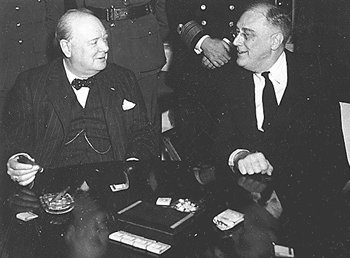
Seventy-six years ago today, the Japanese attacked Pearl Harbor. President Roosevelt famously called it a day that would “live in infamy.”
But what was it to Winston Churchill, far across the Atlantic in blacked-out and battered England, fighting the Germans alone?
By December 1941, England had already been at war with the Germans for over two years. Since 1940, the British had been subject to unremitting air raids during the Blitz. More than 40,000 civilians were killed. In London, more than a million homes and buildings were destroyed or damaged.
During these years, Churchill kept almost daily correspondence with Roosevelt, cajoling, warning, and pleading, trying to convince him to join the war. Roosevelt did what he could, mainly sending some ships, guns and envoys, but his hands were tied. U.S. public opinion wanted nothing to do with another war in Europe.
Then the Japanese attacked Pearl Harbor. At the time, Churchill was at Chequers, the country house of British prime ministers. He heard the news on the radio, and called the president right away to confirm. “We’re in the same boat now,” Roosevelt told him, and Churchill spent the evening listening to BBC reports with a strange mix of emotions, the strongest of which was exhilarated relief. England was no longer alone. That night, as he wrote in his memoirs, he “slept the sleep of the saved and thankful.”
The next day, Churchill lost no time and invited himself to the White House. He and his advisors sailed to America, arriving December 22 for a three week stay. Roosevelt showed up to greet him in his limousine (confiscated by the government from Al Capone). Churchill wore a double-breasted peacoat, bow tie, and naval cap. He carried a walking stick jimmied with a flashlight for London blackouts. The New York Times reported he was “somewhat shorter than expected.”
At the White House, Churchill and Roosevelt stayed up long hours, talking, smoking, and drinking, much to the annoyance of the First Lady (in later years, Churchill would remark to her “You never have really approved of me, have you?”). Roosevelt had a preference for martinis, the more vermouth the better. Churchill had a hatred for cocktails and in particular vermouth. He informed Fields, the White House butler, to have plenty of Scotch and whiskey on hand.
The days filled with meetings, press conferences, and strategy sessions. Roosevelt’s advisor, Harry Hopkins, called the upstairs hall of the White House “the headquarters of the British Empire.” Churchill went around the White House in one of his famous one-piece siren suit. An animal lover, he played with the Roosevelts’ Scottish terrier, Fala. One morning, Roosevelt wheeled into Churchill’s room to find the prime minister just out of the bath, pacing the floor, and dictating to a (male) stenographer completely nude, the prime minister’s towel having fallen away. Later, Churchill would report that he was “the only man in the world to have received the head of a nation naked.”
Churchill spent Christmas with the Roosevelts, and on December 26 he addressed Congress, proclaiming with his typical dramatic flair that “the United States, united as never before, have drawn the sword for freedom and cast away the scabbard.”
When he eventually returned to England, he left Roosevelt and his staff exhausted in his wake. Harry Hopkins checked himself into a naval hospital to recover. But an alliance was formed, a friendship cemented, a strategy for winning the war mapped out. For the British and for Churchill, struggling for so long all alone, in the grim tragedy of Pearl Harbor, there was at last a glimmer of hope.
September 7, 2017
They Grow Up So Fast
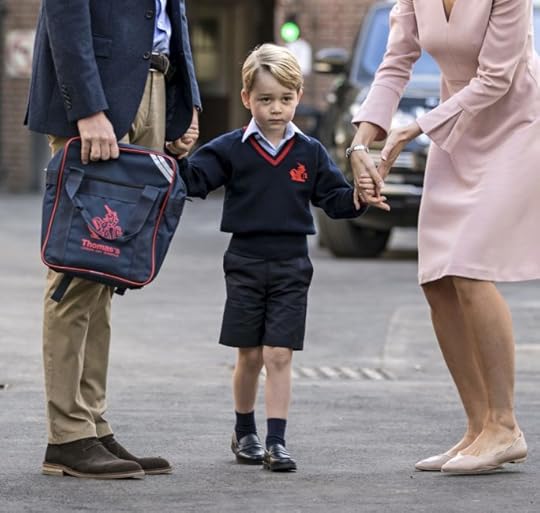
I thought writing a book was fun. I spent 12 years researching, writing, and dreaming about finding an agent and a publisher. It was kind of like a game. Two years ago I signed with an agent. Last year, I signed with a publisher. We went through edits. We came up with a cover.
Now, the book has been printed. Advance Reader Copies are being sent out. Wickwythe Hall is up on Amazon for pre-order. September 30, the release date, is fast approaching.
This is the scary part: putting it out there. It feels like I’m sending my first-born to his first day of school. It’s nerve racking and exciting all at the same time. I hope my baby makes friends. I hope he’s not sitting at the lunch table all by himself. I hope people like him.
July 25, 2017
Have You Seen the Movie Dunkirk?

*warning: minor spoiler at the end*
In the opening scene of Dunkirk, German bullets ricochet off old buildings in the French seaside resort. Helped by French soldiers manning a perimeter, a young British soldier weaves his way to the shore. There, as the Germans close in, tens of thousands of British soldiers are cornered, facing a bleak and impassable English Channel, empty save for one lone British hospital ship bobbing against a mole.
How did the British army end up in this predicament?
On May 10, 1940, after long months of what was termed a “Phony War,” the Germans invaded Belgium in a surprise, early morning attack. French and British troops had been gathered for months around France’s Maginot Line, fortifications along the Belgian border meant to keep the Germans out of France forever. Alerted to the invasion, the troops sprung to action, moving into Belgium to turn the Germans back.
Instead, it went the other way around. Stunned by the overwhelming superiority of the modern German tanks and planes, the British and French armies disintegrated into full out retreat. As their trucks sped away from the front in disarray, French civilians watched from their doorsteps in horror. In Wickwythe Hall, Annelle LeMaire is one of these civilians:
The British were fleeing. The French army was too, their trucks mixed in with the British. These soldiers were the defenders. If they were retreating, what did that mean for everyone else?
The civilians took to the road, Annelle among them, fleeing with what few possessions they could carry. Eventually, the roads became clogged with people. German Stukas dove overhead, strafing and bombing the refugees as the Germans pushed deeper into France at an unstoppable pace. Many French civilians were carried north along with the army, all the way to Dunkirk.
There, the Channel stretching out into the horizon, Annelle sees the British soldiers queued up on the beaches and realizes what’s happening:
The British army was leaving. In the dunes, some of them hid, their heads dotting the beach, their bodies buried beneath the sand, waiting for orders, waiting for their turn to go. But the French civilians had no orders to wait for. They had no ships to take them to safety. They were trapped. Dunkirk was the end of the world, the end of France.
In Wickwythe Hall, Mabry Springs is in England, greeting the train loads of rescued British soldiers. Britain’s army was saved, barely, and the mood ranged from jubilant to somber relief. Then Mabry meets Annelle who managed to make it across the Channel too, and for the first time Mabry sees what’s happened through French eyes:
The French and British were allies, but when the Germans invaded France, the British fled. They had to abandon France to have a chance of saving England. Mabry saw it so clearly now when it hadn’t even occurred to her before. To England, the Miracle of Dunkirk. To the French, complete and utter treachery.
For the French, there were no miracles, just beaches strewn with bodies, discarded helmets and equipment, ruined vehicles, all that the British couldn’t carry. France surrendered just six weeks after the German invasion then endured four years of brutal occupation.
Thanks to Dunkirk, the story of the heroic rescue of the British army isn’t lost to history. But the story from the French perspective shouldn’t be lost either. The story lines of the characters in the movie and what they endured are moving. The helpless British soldiers. The fearless, stoic fighter pilots. The humble civilian sailors.
But perhaps the most nuanced story line in Dunkirk is that of the quiet “British” soldier—whom the viewer learns is actually French—whose fate as an expendable ally is allegoric of the fate of France and its complicated relationship with England.
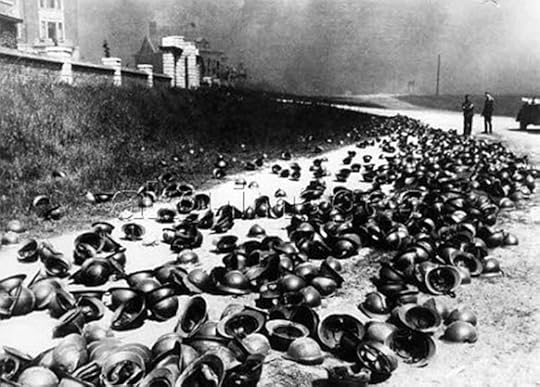
May 16, 2017
We shall wear them on the beaches, we shall wear them on the landing grounds, we shall wear them in the fields and in the streets…

https://www.kickstarter.com/projects/...
Last night, a national news channel ran a piece on a Kickstarter campaign to raise money for a product called the RompHim that’s been getting a lot of media attention. As the caption on the Kickstarter page states “Is it a romper designed for men? Sure. But it’s also pretty damn comfortable, and it may just be the start of a fashion revolution.”
A fashion revolution or a sign of the end of civilization as we know it--you be the judge. But either way, some credit should be given to the RompHim's precursor, Winston Churchill’s World War II siren suit. Is it a coincidence that Churchill usually referred to his siren suits as “romper suits”?
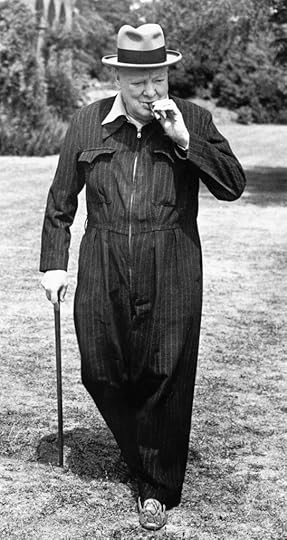
Churchill was a soldier, an author, a statesman, a horseman, a bricklayer, and a painter. He was also very fashion conscious. If you don’t agree, notice the python slippers he’s wearing above, not to be outdone by the exquisite monogrammed slippers in the photo below. Inspired by the boiler suits sported by his fellow members of the bricklayers union, Churchill devised his romper as a roomy, one piece ensemble to pull on over whatever he was—or was not—wearing when the air raid sirens went off. When Hitler’s Luftwaffe arrived, one had to look presentable in the shelter.
But Churchill had too much style to look just presentable. His rompers were tailor made to his demanding specifications by Turnbull & Asser in London, where today his plush green velvet romper, a cigar jutting out of the breast pocket, is on display. Much as the RompHim comes in a variety of patterns and fabrics—red chambray, blue chambray, splatter print cotton and even a Fourth of July “special edition”—Churchill had his siren suit custom made in a variety of styles. Powder blue serge, denim, pinstriped grey wool, black velvet for special occasions. It’s said he had at least twelve of them.
They were so comfortable, he took to wearing them even when the sirens weren’t blaring. He wore one at the White House visiting FDR, in a meeting with Eisenhower plotting the D-Day invasion, in his studio when he painted, and whenever he pretty much felt like it.
Churchill’s siren suit caught on with the general public in England during World War II. It was common for wives and mothers to make them of plain cloth with no decoration for their family members to keep close by in case of air raids, which were often in the middle of the night, catching Londoners in their pajamas. But after the war, the popularity of Churchill’s romper with those other than Churchill quickly faded.
Now, thanks to RompHims, the spirit of Churchill’s siren suit is revived, albeit in short-short form. And the best part is, it’s not too late to participate. For a pledge of $95 or more, you can get an original RompHim. Given one of Churchill’s rompers went for almost £30,000 at Sotheby’s London in 2002, that’s a pretty good deal.
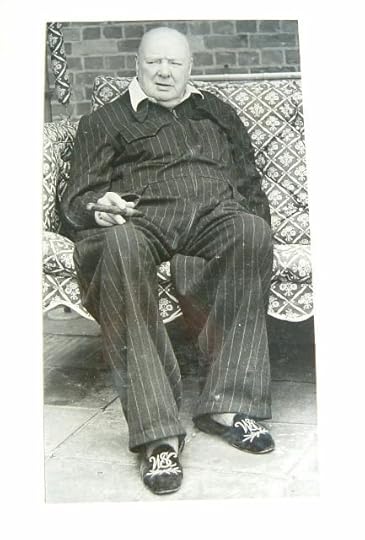
Images from:
https://www.churchillcentral.com/timeline/stories/the-siren-suit
http://sartorialnotes.com/2017/02/01/churchills-romper-suit-siren-suit/
February 8, 2017
Refugees, Walls and Winston Churchill Busts: The More Things Change, The More They Stay the Same
In today’s world dominated by questions of refugees and walls, I’ve noticed interesting similarities to the historic events in my upcoming novel, Wickwythe Hall. The novel opens in May 1940 when the Germans invade France. Annelle LeMaire, a postulant in a French convent, takes to the road, one of thousands of French refugees fleeing the coming German tanks and troops. In France, it was called “L’Exode” or The Exodus.
The swift German invasion took everyone by surprise. This was because after World War I, France had built the Maginot Line, fortifications along the French border that were supposed to keep the Germans out of France for good. Considered impenetrable, the French thought they were safe behind their “wall.” Until the Germans broke through it.
So we have refugees and a wall. What about Winston Churchill?
Much like his bust that was retired from President Obama's White House for eight years, Churchill had been effectively banished from politics in England in the decade before the German invasion of France. He was considered washed up, a warmonger, and a crackpot with his ranting and raving about the menace of Hitler. He’d retreated to Chartwell, his home in the English countryside, where he painted and built brick walls, a pastime he enjoyed so much he even became a member of the Bricklayers Union. He also wrote scathing articles that urged England to build up its defenses and put a stop to the appeasement policy that allowed Hitler to rearm and grab land at will.
But no one took Churchill seriously. The First World War had been so devastating, the general consensus was humankind had learned its lesson at last. There would be no more war.
Then the Germans broke through the Maginot Line. The roads in France were clogged with refugees seeking to escape the terrors of war. And that very day, the British dumped Neville Chamberlain, author of the appeasement policy, and put Churchill back into the British version of the Oval Office as Prime Minister. After five long years of “blood, toil, tears and sweat,” the Allies, in the end, were victorious.
And guess what? They couldn’t have done it without the help an evil, Russian dictator.
As our heroine Annelle LeMaire might say, plus ça change, plus c'est la même chose.
